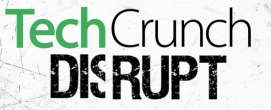 Warning: Long post ahead. If you just want the trailer, it’s this – “Everything is changing. Again.”
Warning: Long post ahead. If you just want the trailer, it’s this – “Everything is changing. Again.”
Tomorrow morning we’ll kick off our most ambitious event to date, TechCrunch Disrupt, in New York. The event is sold out, but we’ll have tens of thousands of people also tuning in to the livestream of the three day event. If you’re not attending, watch that livestream from the comfort of your office, living room or wherever it is that you people spend your time. There are some things happening at the event that you don’t want to miss.
We’ve called the event TechCrunch Disrupt, but we weren’t thinking about the name as a theme for this particular event. It’s our go forward brand name for our three-times-a-year launch and tech conferences.
And yet, as I have conversations with the launching startups and the amazing speakers lined to to talk at Disrupt, it’s become clear to me that we are indeed in a massively disruptive moment. And by moment I’m not talking about a generation or a decade. I’m talking about things happening right this moment in time.
These conversations are why, for the first time, I am extremely nervous to go on stage tomorrow morning.
Until the last few days it hasn’t crystalized for me. It’s sort like when you’re getting the flu and you feel the symptoms come one by one. Stomach ache, no problem. Headache, ouch. Cold sweat – uh oh, I’ve caught something.
The “symptoms” I’ve noticed are only there because I’ve been sitting down with these people – leading entrepreneurs, venture capitalists and others – and just listening to what they have to say. Putting it all together in my head. Discounting for bias. And after all that, what they are saying is making a lot of sense to me.
You are going to hear a lot over the next three days about how our world is changing in a fundamental way. It’s easy to think about what’s happening now as just a further evolution of the Internet era. But the disruption from this change is more profound than that.
Before I dive deeper, here’s a taste of what I’m talking about. Venture capitalist John Doerr, who is arguably the most successful venture capitalist of all time, told me this during our briefing call for Disrupt:
Zynga is the fastest growing business Kleiner Perkins has ever invested in.
That was said by a man who’s firm has invested in Google. And Amazon. And AOL, Compaq, Electronic Arts, Flextronics, Genentech, Intuit, Lotus Development, LSI Logic, Macromedia, Netscape, Quantum, Segway, Sun Microsystems, and Tandem, among many, many others.
Zynga. The fastest growing business Kleiner Perkins has ever invested in.
First thing tomorrow John Doerr is going to outline why he thinks that is happening. He’ll talk about the Third Wave.
The First Wave was personal computers and the wave of disruption that caused. The second wave was the Internet, ditto. We are now, says Doerr, in the Third Wave.
What exactly is the Third Wave? It’s the tectonic shifts we’re seeing in mobile platforms (read his post here about the iPad), the social graph (particularly Facebook), and online commerce. All of these things are related and being accelerated by each other (Facebook is the largest mobile application, Zynga leverages Facebook and also stokes Facebook growth, Groupon is social/flash commerce, etc.).
Yuri Milner, who is second on deck on tomorrow morning’s agenda after John Doerr, made sense of all this to me over lunch yesterday.
Milner is investing in the fastest growing consumer Internet companies, and he’s doing it more aggressively than anyone else. He has stakes in Facebook, Zynga and Groupon. His method is fascinating and we’ll be diving deeper into it tomorrow.
But what shocked me into realizing that Doerr is very, very right and that real disruption is happening right now wasn’t the how he invests, but why he invests, and in who. Why is he so confidently investing hundreds and hundreds of millions of dollars in companies at multi-billion dollar valuations?
The Internet was a tremendous business accelerator, he says, but Facebook is another accelerator on top of that. Zynga’s Farmville grew to 75 million users just a few months after launching last year, and the company went from near zero revenue a year ago to hundreds of millions of dollars today.
It wasn’t that Zynga invented the killer game (every single Zynga game was copied from someone else, in fact). It’s that CEO Mark Pincus understood better than anyone else how to leverage that Facebook accelerator and ride that tsumani.
And when I asked him what Groupon, his third U.S. investment, has to do with the Facebook accelerator effect? He says that they grew so incredibly fast simply by advertising on Facebook.
Groupon tweaked and tweaked their model endlessly until they got it right – they felt real traction. Then they turned on the advertising. And what worked wasn’t television spots or Google ads. It was Facebook.
That must be freaking Google out right about now. It’s also the cornerstone of my belief that we are entering into the Age of Facebook. At no point in history has such a large number of people interacted so intimately with anything. Facebook’s half a billion monthly visitors is probably far more meaningful (although not yet as lucrative), as the nearly 1 billion people who visit Google each month.
The depth of interaction with Facebook is unprecedented. And it explains a lot of the privacy hysteria we’re all going through with them right now.
Ok, Back To Earth
The Third Wave is happening, but that doesn’t mean that Facebook, Zynga, Groupon, Twitter and a few others are the only winners, or even the biggest winners. Facebook may have created a monster that it simply cannot control, for example. The social graph, over time, may well become more of a federated model with many players. Listen closely to what both Milner, a Facebook investor, and Doerr, who isn’t, have to say about that tomorrow.
But those are just the historical details about who wins and who loses. The shift is happening right now. Groupon is blowing away Amazon’s early revenue and profit milestones by a scary factor, for example. Don’t think Amazon isn’t looking at Groupon with the same wary eye Google uses on Facebook.
And when you look at the world in this way – a Third Wave – it becomes easier to understand the strategic moves by the incumbents from the Second Wave. Yahoo is fleeing, looking for a warm place to hide. AOL is BFFing Facebook. Facebook is trying to set up the chess board so that they win all of this in the long run. And Google is standing toe to toe with Facebook and will not be backing down any time soon.
Meanwhile, the only mobile platforms that matter even a smidgen right now are the iPhone and Android. And that war looks too much like the Windows/Apple wars in the 80s over dominance of the personal computer.
There is so much creation going on around us. With that comes destruction, too. Nobody dies quietly in an all out war.
